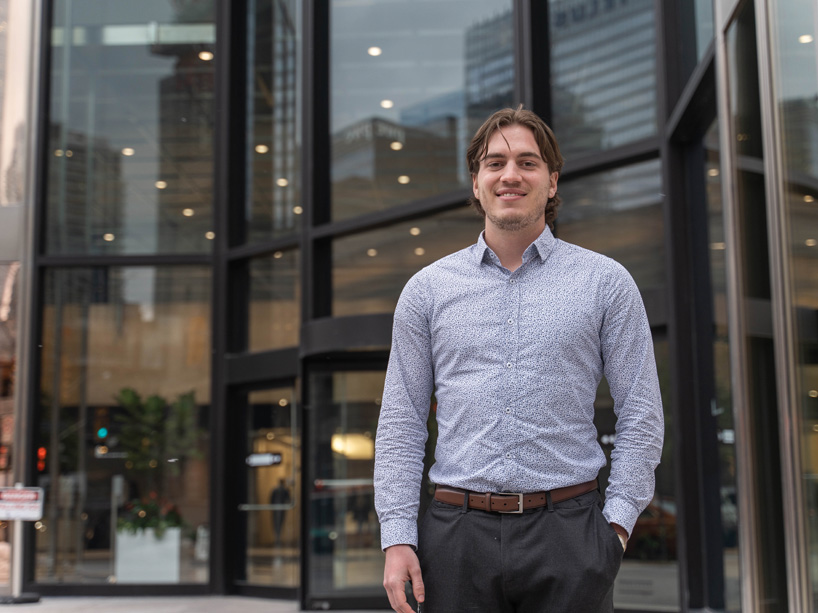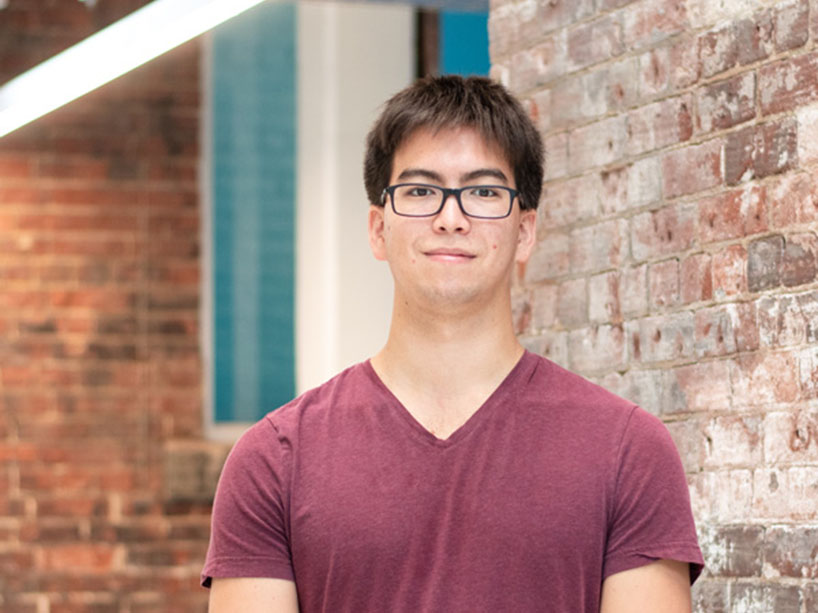Math plus finance equals successful careers for these grads

Sadia Billoo is one of three grads who share how they earned coveted roles at top financial institutions in downtown Toronto. Photo credit: Jaye Huynh.
The Faculty of Science launched 10 years ago with the goal to prepare students for the real world. The financial mathematics program, which took off in 2013, was the first of its kind offered at the undergraduate level, teaching a wide range of technical skills that are in demand by the financial services industry.
The program gives students an in-depth knowledge of economics, finance, statistical techniques and mathematical modeling.
“Given the complexity of the modern financial system, there’s a huge need for workers who can build mathematical models for finance,” said Alexey Rubtsov, associate professor at the Department of Mathematics. “Years ago, if they existed at all, financial math programs were at the master’s or PhD level.”
Rubtsov started teaching the financial mathematics program in 2017 and says it is critical to prepare students for jobs in Toronto – the financial capital of the country. Rubtsov says the curriculum is regularly updated to include new topics such as artificial intelligence, blockchains, and cryptocurrencies. By studying these cutting-edge subjects, students are very well positioned for success in today's dynamic job market.
We caught up with three graduates who are excelling in their fields and applying what they learned in this program.
The risk specialist who found balance between technical and soft skills

Paul Desroches applies the technical and soft skills he learned to his job at RBC. Photo credit: Jaye Huynh.
Name: Paul Desroches, ’20
What is your current job?
Manager of counterparty credit risk at RBC Capital Markets.
What do you do?
I’m in charge of assessing the risk of the new deals that come in through the trade desk. My team in the risk department is like a brother to the trade desk where the deals are made because we need to assess how risky their decisions are and eventually come to an agreement. It takes strong technical skills but also equally as strong communication skills to effectively argue my position.
What was your experience in the financial mathematics program?
It was definitely harder than many other programs because it’s kind of like a double major – you are studying both math and finance courses separately until they come together in the end. It took me a bit of time to adjust to but I honestly just clamped down and worked together with colleagues and professors to succeed.
What skills did you apply from school to your career?
The program really encourages you to develop your technical and problem solving skills, which is something I have applied regularly while working in a technical position at the bank. However, the networking and communication skills I gained are equally important as these are ultimately what will direct your career. I also developed my time management skills because the program was so busy and it was challenging to balance all the required courses.
What advice would you give to aspiring students?
You don’t have to have everything figured out yet – just pick a path that looks interesting and go for it. The program opens up a lot of opportunities because you could go into corporate finance, risk management, data analytics or stay in academia. See how it goes in your first year and keep reevaluating which path you’d like to take.
The quantitative associate who focused on extracurriculars

Sadia is working at RBC as a quant associate. Photo credit: Jaye Huynh.
Name: Sadia Billoo, ’19
What is your current job?
Quantitative Associate in Treasury and Market Services at RBC Capital Markets.
What do you do?
I work with the traders on the treasury desk to build and apply mathematical pricing models for various financial products such as bonds and swaps. I also monitor risk factors such as interest rates and ensure that these changes are being translated into prices and accounted for when calculating the portfolio risk for the desk.
What was your experience in the financial mathematics program?
The program was unique because it was a great combination of applied mathematics and finance. I also had the opportunity to pursue a minor in computer science, so it was very flexible in the sense that I gained the technical skills that translate well into the professional sphere.
What skills did you apply from school to your career?
In my final year I took a financial risk management course and applied a lot of the concepts to my first job as a quantitative risk analyst at RBC. The course, and program overall, helped me understand the overall risk framework.
What advice would you give to aspiring students?
I would tell them not to just focus on academics – it’s important to pursue extracurricular activities and develop good relationships with your professors. All skills are transferable!
The programming whiz tackling tough math problems

Kenji Hewitt encourages aspiring students to attend networking events and make friends in their classes.
Name: Kenji Hewitt, ’19
What is your current job?
Project control officer at TD Bank.
What do you do?
I work on modernizing existing risk models and replacing them with the machine learning equivalent to see if we can build a better model.
What was your experience in the financial mathematics program?
The program set me up with an excellent knowledge of programming, finance and math that I consistently apply to problems that arise at my job. Graduating with this trifecta of skills will make you a force to be reckoned with!
What skills did you apply from school to your career?
I apply the critical thinking and problem solving skills that I practiced during my undergraduate career to my job every day. I’m regularly tasked with researching how to best tackle mathematical problems, keeping in mind the technical challenges we could face, as well as being aware of the data limitations.
What advice would you give to aspiring students?
Make sure you engage in networking events outside of school and make a lot of friends in your classes because these people could be your future colleagues. You don’t need to be the biggest math genius to work at a bank – you just need a solid level of foundational math and programming knowledge, good communication skills and a drive to learn and succeed.
Related stories:





